Backyard chickens in Polk County are very popular. Everyday more people are raising chickens on their property. It is important for anyone that is raising or is planning to raise birds to always verify their local ordinances. Whether it is just as a hobby, for egg production or for meat production, having chickens in our homes will teach us about animal behavior, nutrition, and health.
What is Coccidiosis
Chickens, as well as any other animals, can get sick. It is our job to maintain our animal’s health to avoid possible disease. One of the most common disease in backyard poultry flocks is coccidiosis. Coccidiosis is an intestinal parasitical disease caused by a protozoan named Eimeria ssp. Coccidia is most likely to be present wherever chickens are being raised. Outbreaks for coccidiosis may be mild to severe. Adult chickens develop immunity to the disease. However, to create this natural resistance it is important to manage the flock correctly. To achieve this, we must know the life cycle of Eimeria ssp. and have a biosecurity program to prevent infections. Eimeria ssp. transmission occurs when non-infected chickens ingest the oocyst (eggs) of the parasite present in contaminated feces. These feces can be in dirty waterers, feeders, and any area where chickens are present. After ingestion this oocysts hatch, invade the intestinal tissue causing damage. In the intestine the parasite creates more oocysts that are released in the feces and the cycle repeats itself.

Symptoms to look for
Coccidiosis symptoms may include weight loss, blood in feces, diarrhea, drop in egg production and high mortality in severe cases. Biosecurity is extremely important to prevent coccidiosis infections.
Prevention is key
Maintain areas (coops, cages, yards) where chickens are present clean with good ventilation to avoid having hot and humid conditions where the parasites thrive. Always wash your hands before and after managing chickens to avoid spreading disease between birds. Always quarantine new birds for at least 30 days before adding them to the flock. Likewise, if you suspect that one of your animals is sick, separate it to avoid any possible transition. Never use borrowed equipment from your neighbors unless you don’t have any other choice, and if this is the case, disinfect the equipment before and after handling your chickens.
Remember, it is always cheaper to prevent coccidiosis rather than treat the disease. If you need treatment, coccidiostats can be added to the feed of chickens and there are vaccines currently available. Always consult a veterinarian when using medication.
Final remarks
Coccidiosis is one of the most common diseases in backyard chickens. Knowing the life cycle of Eimeria ssp. is essential if we want to prevent the transmission of this disease. A good biosecurity program will prevent the disease and is our responsibility as poultry keepers to promote healthy environments for of our birds. All in all, raising chickens can be rewarding, but precautions must be taken to avoid infectious diseases such as coccidiosis. For more information on backyard poultry production, please call the UF/IFAS Extension Polk County at 863-519-1049 or send me an email at lrodriguezrosado@ufl.edu
Further information:
https://edis.ifas.ufl.edu/publication/AN239
https://edis.ifas.ufl.edu/publication/PS029
University of Florida is an equal opportunity institution
 0
0
